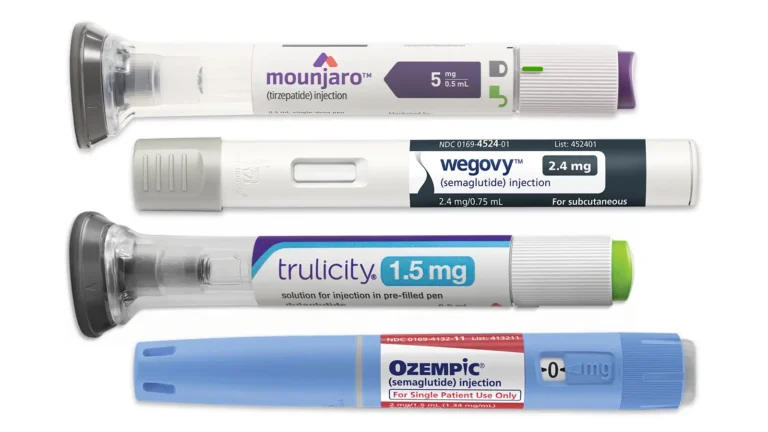Can GLP-1 Drugs Help Treat Addiction? 5 Breakthrough Findings You Should Know
Table of Contents
ToggleCan GLP-1 Drugs Help Treat Addiction? 5 Breakthrough Findings You Should Know
GLP-1 drugs and addiction may not seem like an obvious pairing — but recent scientific discussions suggest a surprising link.
Originally developed to treat type 2 diabetes, drugs like Ozempic, Wegovy, and Mounjaro are now being explored for a new frontier: addiction treatment.
As highlighted in a recent Medscape article, these GLP-1 receptor agonists appear to affect the brain’s reward system—offering possible benefits for people with substance use disorders, binge eating, and compulsive behaviors.
Could this be a game-changer in the fight against addiction?

Weight loss drugs reduce cancer risk — a bold and promising claim gaining attention due to recent research into GLP-1 receptor agonists such as Ozempic, Wegovy, Mounjaro, and Zepbound. Initially developed for diabetes and obesity, these medications are now showing unexpected benefits in cancer prevention. Could this reshape the role of obesity drugs in public health?
 What Are GLP-1 Drugs?
What Are GLP-1 Drugs?
GLP-1 receptor agonists mimic a naturally occurring hormone (glucagon-like peptide-1) that helps:
Regulate appetite
Increase insulin secretion
Slow gastric emptying
Support blood sugar control
Common GLP-1 drugs include:
Ozempic (semaglutide)
Wegovy (higher-dose semaglutide for weight loss)
Mounjaro (tirzepatide, a dual GIP/GLP-1 agonist)
These medications have become household names for weight loss and diabetes management — but now they’re attracting attention for neurological effects too.

1. The Brain-Reward Connection
GLP-1 drugs don’t just act on the gut and pancreas — they also have direct effects on the brain.
They influence areas of the brain involved in reward, motivation, and impulse control — including:
The nucleus accumbens
The ventral tegmental area (VTA)
The prefrontal cortex
These regions play a central role in addiction, including cravings for:
Alcohol
Nicotine
Opioids
Highly processed foods
In animal studies, GLP-1 drugs have been shown to reduce dopamine signaling in these regions, thereby dampening the brain’s reward response to addictive substances and behaviors.
2. Early Research Shows Promise
While most current evidence is preclinical, it is promising.
🧪 Key findings:
Rodents given GLP-1 drugs showed less interest in alcohol, cocaine, and heroin.
In humans, some patients report reduced cravings for smoking, alcohol, or binge eating while on Ozempic or Wegovy.
A few small pilot studies are investigating semaglutide’s effect on alcohol use disorder (AUD) and nicotine addiction.
For example, researchers at the University of North Carolina are currently testing semaglutide as a treatment for alcohol use disorder, and early results are expected in late 2025.
3. Food, Alcohol, and Drug Cravings

GLP-1 medications are already known for their ability to reduce appetite and cravings — particularly for highly palatable foods.
This has led scientists to explore how that same craving-reducing effect could apply to other forms of addiction.
🚬 What people report:
Less interest in snacking or emotional eating
Reduced desire to drink alcohol
Feeling “numb” to substances that previously triggered reward
This may be due to GLP-1’s role in dopamine regulation — the same neurotransmitter that drives many compulsive behaviors.
4. Clinical Gaps and Limitations
Despite the hype, experts caution that the evidence is still early and incomplete.
 Limitations include:
Limitations include:
Lack of large-scale randomized clinical trials (RCTs)
Unknown long-term effects on brain reward pathways
Potential for tolerance or diminished effect over time
Concerns over misuse or off-label use for addiction without proper oversight
Additionally, addiction is a complex, multifactorial condition, and a single drug is unlikely to be a cure-all.
Dr. Lorenzo Leggio, a leading addiction researcher at the NIH, told Medscape:
“GLP-1s are promising, but we’re a long way from saying they are effective treatments for addiction.”
5. What Comes Next?
The next few years will be critical as researchers begin large-scale trials to answer key questions:
Can semaglutide or tirzepatide help with alcohol or opioid use disorders?
What are the long-term cognitive effects of GLP-1 drugs?
How do they perform compared to current addiction treatments (e.g., naltrexone, bupropion)?
In the meantime, doctors should proceed cautiously and consider off-label use only when supported by evidence and guided by addiction specialists.
🧾 Conclusion
GLP-1 drugs like Ozempic and Wegovy have already revolutionized weight loss and diabetes care. Now, emerging research suggests they may also help people struggling with addiction by targeting the brain’s reward system.
While more clinical trials are needed, the potential is undeniable.
If proven effective, GLP-1 medications could represent a paradigm shift in addiction medicine, helping patients regain control over cravings, reduce relapse, and improve overall quality of life.
As always, patients should consult with their healthcare providers before considering these medications for anything beyond their approved uses.
 References
References